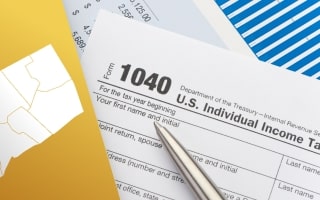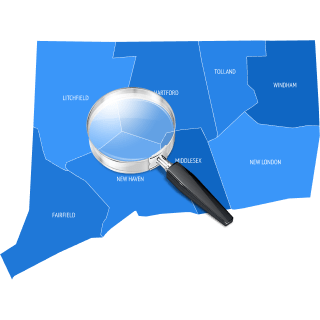Property Tax Records in Connecticut

Owning a home offers many advantages, from tax benefits and equity building to more privacy and security. The one downside is that you'll likely need to pay property taxes. This money is typically used to pay for public services that require funding. In Connecticut, you'll be tasked with paying high property taxes that are nearly double the national average. Property taxes in Connecticut are the second highest in the nation.
Two factors determine how much taxes you pay: the city you live in and the value of your home. The average property tax rate in the U.S. is around 0.87%. In Connecticut, the property tax rate for single-family homes is 1.54%. The main difference between Connecticut and most other states is that counties don't have control over property taxes. Instead, each city sets its own rate.
Once you buy a home in Connecticut, you'll need to pay property taxes every year. The amount can change if the value of your home increases or decreases after an appraisal. Homeowners in Connecticut have been tasked with paying property taxes since the middle of the 17th century. While this tax was initially limited to certain types of property, it was eventually applied to all forms of real estate.
Property Tax Assessment in Connecticut

In Connecticut, property taxes can differ depending on where you live. Some cities charge more than others based on how much money they need to raise to cover the costs of public services and school systems. Regardless of where you live, you'll need to pay property taxes twice a year.
These payments are due on July 1 and January 1. To avoid penalties, make sure you pay within 30 days following the due date. After 30 days have passed, the city will charge an interest rate of 18% per year. While payments are due twice every year, you'll only receive one property tax bill. The bill should be mailed to you in July.
Property taxes are based on your home's assessed value instead of its market value. The state requires cities to perform appraisals every five years, but city officials typically appraise homes more often. The value of your home can change after an appraisal. An increase in value could be caused by inflation or home renovations.
When determining your property taxes, you need to know how the mill rate works within the state. A single mill is the same as $1 in tax for every $1,000 of assessment. Cities often assign mill rates between 20 and 30.
Let's say that your home has a market value of $200,000. The assessment ratio in Connecticut is 70%. In this situation, property taxes will be calculated based on an assessed value of $140,000.
There isn't a statewide mill rate in Connecticut, as it varies from county to county. If you live in a city with a mill rate of 25, you need to multiply 25 by 140. You'll end up with an annual tax bill that amounts to #3,500. Keep in mind that the town council or board of finance sets the mill rate based on the education budget, local services, and municipal salaries. The average property tax rates in the most populous counties throughout Connecticut are:
- Fairfield County: 1.83%
- Hartford County: 2.40%
- New Haven County: 2.38%
- New London County: 1.95%
- Litchfield County: 2.07%
As you can see, there is a huge difference between property taxes in Hartford County and New London County, which is something to consider when you buy a house in Connecticut, as Connecticut property tax rates vary.
Calculate Connecticut Taxes
In Connecticut, property taxes are levied and collected at the municipal level, and each town sets its own mill rate (tax rate per $1,000 of assessed value). A smart way to understand how property taxes are computed in Connecticut is to use a Connecticut property tax calculator. This tool simplifies the process for both homeowners and real estate investors by allowing users to input key property details and estimate their tax assessment and annual liability based on local municipal rates.
A Connecticut property tax calculator can offer a clearer view of your annual tax obligations and help identify exemptions and relief programs, such as the Homeowners’ Tax Credit Program for seniors (age 65+) and individuals with disabilities, which provides income-based property tax relief. Additional exemptions are available for veterans, blind residents, and low-income homeowners, depending on eligibility and local policies.
using our property tax calculator.
Connecticut Property Tax Records: What Are They?

In Connecticut, property taxes make up more than 70% of all local revenue. This revenue pays for public safety, infrastructure, roads, and recreational services. Property taxes are collected by the local tax assessor.
Once you gain access to the property tax records for a home you're interested in buying, you'll be able to view a lot of important details about the property. When you're searching for the perfect home to buy, it's highly recommended that you review the tax records. These records are usually available online and can be accessed from your local tax assessor's website.
Once you access property tax records in Connecticut, you can usually narrow your search with parameters like owner name, address, and parcel ID. Each tax record includes comprehensive information about the property, which extends to everything from the assessed value to the name of the owner. For example, the tax records in Darien, CT offer categories of information like:
-
Profile
-
Sales
-
Residential
-
Commercial
-
Outbuildings
-
Land
-
Values
-
Permits
-
Sketch
-
Map
-
Photos
The more specific pieces of information you'll be able to verify in a tax record include the following:
-
Address
-
Neighborhood
-
Land use code
-
Acres
-
Zoning
-
Owner name
-
Previous sale dates and amounts
-
Stories
-
Physical condition
-
Year built
-
Total rooms
-
Heating system
-
Square feet
-
Latest appraised and assessed values
Property Tax Exemptions and Deductions in Connecticut

While property taxes in Connecticut are higher than in many other states, you may qualify for an exemption or deduction that will substantially reduce your taxes. Most property tax exemptions and deductions you can gain access to will be handled by the city you live in.
Veteran's Exemption: The main property tax exemption in Connecticut is the veteran's exemption, which is available to veterans who have at least 90 days of wartime service. This exemption amounts to $1,500 for property taxes. Disabled veterans may be eligible for extra property tax exemptions. Speak with your city's tax assessor to determine if you qualify.
Additional Exemptions: Along with basic exemptions for veterans and active-duty members, people who are legally blind or permanently disabled may also have access to tax relief, depending on where they live.
Abatements: Some towns and cities have made ordinances that authorize more deductions and exemptions. If a home is newly constructed or renovated, property tax abatements could be available. Abatements are subsidies that effectively reduce the cost of owning real estate by lowering the taxes you pay. In Connecticut, an abatement could reduce your property taxes by 50%.
Credits: Elderly individuals and disabled homeowners could qualify for property tax credits in certain cities and towns. Connecticut reimburses taxing jurisdictions for these credits. Some cities also provide more property tax relief to homeowners who are at least 70 years old.
If you want to apply for a credit or exemption, you'll need to do so between February 1 to May 15. Keep in mind that a tax credit is different from an exemption. An exemption reduces your property's assessed value. In comparison, a credit directly lowers your annual tax bill.
How To Search Property Tax Records in Connecticut

To search property tax records in Connecticut, there are several resources at your disposal. Most cities in Connecticut maintain online databases that include up-to-date tax records for every property in the area. While every database can differ, you'll likely have numerous parameters you can use to find a property.
For example, entering a street name will show you a list of all the properties on that street. You can then select the specific home you're interested in. Along with all the information mentioned above, most property tax records come with detailed photos and maps.
You can also get this information and find the latest property tax records with a third-party solution. PropertyChecker allows users to view property and deed records for free. You can narrow your search by parcel ID, name, phone, and address. Once you perform a search, you'll receive the following types of information:
-
Loan records
-
Property owners
-
Purchase history
-
Deeds
-
Property details
-
Neighborhood info
-
Property Values
-
Property tax records
-
Foreclosures
-
Building permits
-
Lien records
This information can be invaluable when you're thinking about making an offer on a property and want to do your due diligence.
How To Appeal Property Taxes in Connecticut

Property taxes aren't always correctly assessed by the city. Your home may be overvalued. Given how high Connecticut property taxes can be, it's recommended that you appeal your tax bill if you believe that your home needs to be reappraised. If you want to appeal your property taxes in Connecticut, there is a structured process that you can take advantage of to appeal your property tax bill. Make sure you adhere to the following steps:
Step 1: File your appeal with the board of assessment appeals in the municipality where your home is located. If you're solely contesting the property's valuation, you'll likely have one to two months after you receive your tax bill to file an appeal.
Step 2: The specific process can differ depending on which city you live in. However, you shouldn't need to pay a filing fee. If you live in the city of Stamford, you can submit the appeal form at the following address:
Board of Assessment Appeals
888 Washington Blvd., 6th Floor
Stamford, CT 06901
Some cities allow appeals to be filed online. In Stamford, the due date for property taxes is January 1. An appeal must be filed by February 20.
Step 3: If you submit your appeal on time, a hearing will be set. Make sure you bring supporting documents and evidence to your hearing. You'll need to convince the Board of Assessment Appeals that your property valuation is incorrect.
Step 4: After your appeal is heard, the Board can decide to decrease or increase your assessment or make no changes. Once the Board makes its decision, you'll receive a notification within a week.
Step 5: If you disagree with the Board's decision, you can appeal to the Superior Court. This appeal must be filed within 60 days of the initial notification. You'll also need to pay a filing fee of around $360.
How Property Tax Records Impact Real Estate Transactions in Connecticut

Property taxes can impact all facets of a real estate transaction, especially in Connecticut. Annual property taxes are often included in a homeowner's monthly mortgage payments. If you're thinking of buying a home in Connecticut, you'll need to consider your property taxes when calculating your mortgage payments.
If you want to sell a home in a city with a high property tax rate, you may need to make a concession or two to receive offers from potential buyers who may be turned off by higher property taxes. It's a balancing act that requires knowledge of the local market to navigate properly. Since the average property tax rate is well above 1.50%, this factor will likely be considered in nearly all real estate transactions, large and small.
As touched upon previously, most cities in Connecticut charge an annual interest rate of 18% on all delinquent property tax bills. Even if you don't receive your tax bill in the mail, you'll still owe taxes and interest for a missed payment.
After the initial 30-day grace period is over, you'll receive a delinquent statement. All delinquent notices are followed by payment demands. Eventually, an Alias tax warrant could be issued, which includes an additional fee of $6.
A lien can be placed on your property as well, which means that the sale of the home will be prevented until you pay the outstanding taxes. If a homeowner is unable to get out from under this lien, their property could be foreclosed on. In this scenario, the property may be auctioned off, which allows investors to bid on an affordable home.
Cities and counties often hold tax sales that are open to the public. You should be able to find in-depth information about public tax sales on a city's website. If you make a successful bid for a property, you must pay the outstanding taxes before the title is transferred to you.
Free Connecticut Property Tax Lookup
Tax Records Please wait...
Property Tax Guide
- Property Tax Records in Connecticut
- Property Tax Assessment in Connecticut
- Connecticut Property Tax Records: What Are They?
- Property Tax Exemptions and Deductions in Connecticut
- How To Search Property Tax Records in Connecticut
- How To Appeal Property Taxes in Connecticut
- How Property Tax Records Impact Real Estate Transactions in Connecticut
Instant Access to Connecticut Property Records
- Owner(s)
- Deed Records
- Loans & Liens
- Values
- Taxes
- Building Permits
- Purchase History
- Property Details
- And More!
Free Connecticut Property Tax Lookup
Tax Records Please wait...
Property Tax Guide
- Property Tax Records in Connecticut
- Property Tax Assessment in Connecticut
- Connecticut Property Tax Records: What Are They?
- Property Tax Exemptions and Deductions in Connecticut
- How To Search Property Tax Records in Connecticut
- How To Appeal Property Taxes in Connecticut
- How Property Tax Records Impact Real Estate Transactions in Connecticut